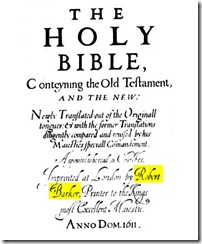
“If thou hast a Bible in the house right now and readeth it at least once a month, chances are strong it’s the majestic King James Version of the Bible in Elizabethan English”Now that’s not too hard to understand, is it? Neither is the rest of it. Look up a few words (or get e-Sword and look up the Strong’s definition of the Greek or Hebrew for even greater understanding.)
Of the 89% of U.S. adults who own at least one Bible, 67% own a King James, which marks its 400th anniversary this year, according to LifeWay Research, a Nashville-based Christian research agency. … 82% of those who read the Good Book at least once a month rely on the translation that first brought the Scripture to the English-speaking masses worldwide.You will find people who state they’ll “Stand by the 1611” or that the spelling of “Saviour” in the King James is the only way! Unfortunately, for many those really are “fightin’ words.” They shouldn’t be.
And my spirit hath reioyced in God my sauiour. (Luke 1:47 KJV-1611)
And my spirit hath rejoiced in God my Saviour. (Luke 1:47 KJV)
I feel much more comfortable reading the second spelling, even if it is slightly less American. There are no changes in the meaning.
When I quote the Bible, I like the fact that the KJV is not under copy right. A group of translators do not own what I read. I do not need their permission to include any words in my posts. I also like the ‘thee’ and ‘thou’ and ‘ye’, which hold different meanings besides our all inclusive ‘you,’ which covers both singular and plural. Was the promise to one, or to all? Pronouns make a difference.
I like using a single version in services, too. When our Junior High Girl’s Sunday School class reads the lesson, we are able to focus on what is being read in each verse rather than the differences in each version. Here’s a small example. Suppose three of the girls had these versions of Daniel 1:1:
NIV: In the third year of the reign of Jehoiakim king of Judah, Nebuchadnezzar king of Babylon came to Jerusalem and besieged it.
ASV: In the third year of the reign of Jehoiakim king of Judah came Nebuchadnezzar king of Babylon unto Jerusalem, and besieged it.
GNT: In the third year that Jehoiakim was king of Judah, King Nebuchadnezzar of Babylonia attacked Jerusalem and surrounded the city.They each provide the same concept, but reading aloud, the focus should be on pronouncing the king’s name (hard enough as it is!!) than on sentence structure. Why not read it all together as:
In the third year of the reign of Jehoiakim king of Judah came Nebuchadnezzar king of Babylon unto Jerusalem, and besieged it. (Daniel 1:1 KJV)
I’ll leave it to theologians to discuss apologetics regarding the translations. My family has chosen to be in a church that uses the King James Version, and I’m quite content in my reading of God’s word.
No comments:
Post a Comment
Thank you for taking time to read and comment on the blog. Comments should take into consideration this verse: Finally, brethren, whatsoever things are true, whatsoever things are honest, whatsoever things are just, whatsoever things are pure, whatsoever things are lovely, whatsoever things are of good report; if there be any virtue, and if there be any praise, think on these things. (Philippians 4:8 KJV)